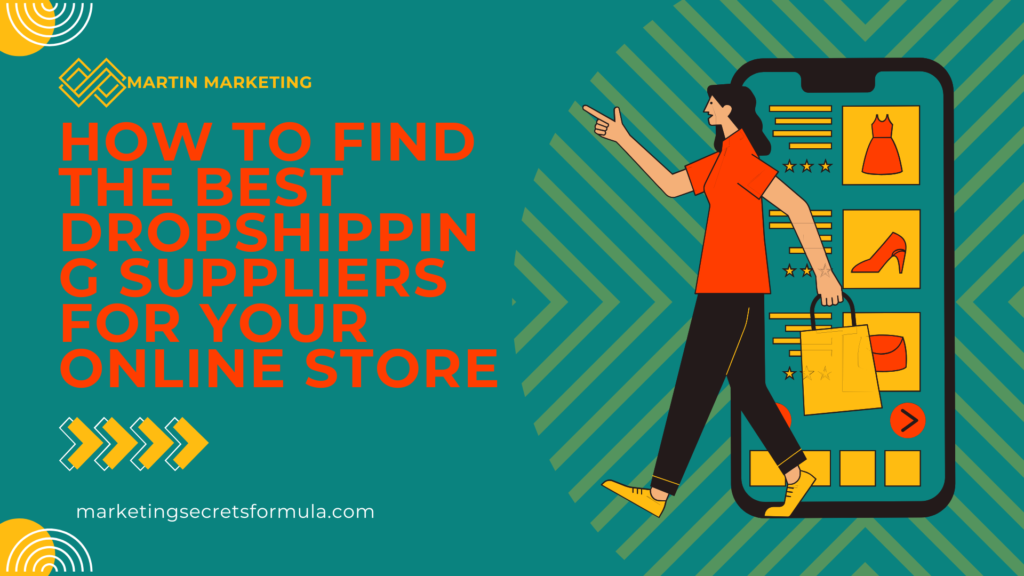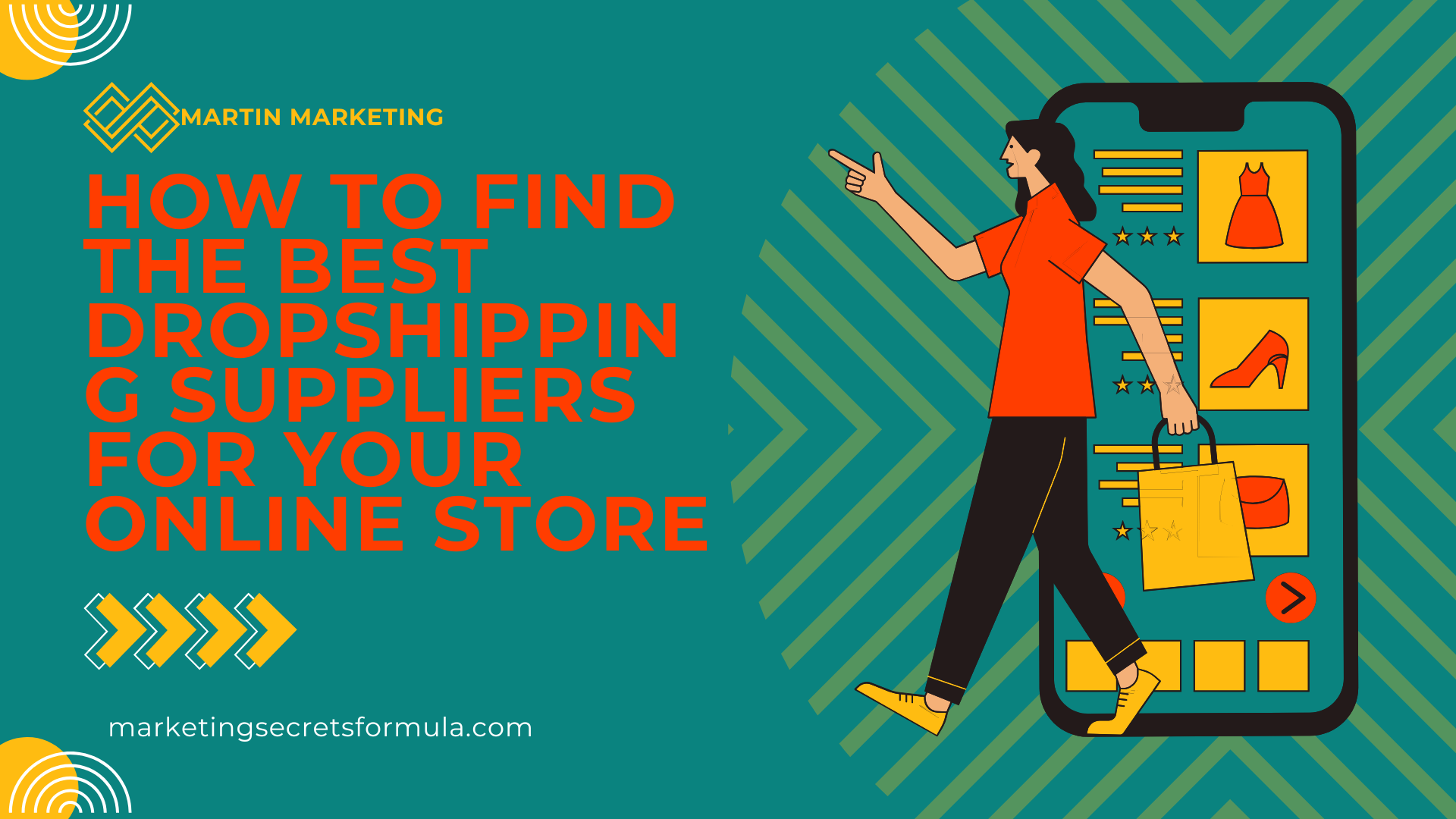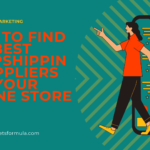Welcome to my article “How to Find the Best Dropshipping Suppliers for Your Online Store” If you’ve ever wondered what separates a thriving dropshipping store from one that sinks faster than your Wi-Fi during a Zoom call, here’s the secret: a great supplier. Yes, finding the best dropshipping supplier isn’t just a task on your to-do list—it’s the task. Your supplier is the behind-the-scenes MVP, ensuring your customers get their orders on time, that the products don’t look like they were made during an art class gone wrong, and that your business actually makes a profit (imagine that!).
But let’s be real—finding the right supplier can feel a bit like online dating. You swipe through options, send a few messages, and hope the relationship doesn’t end in heartbreak (or in this case, endless refund requests). The good news? Unlike dating, there are actual strategies to ensure you pick the right partner. You don’t have to rely on vibes alone.
In this blog, we’ll break down everything you need to know about finding the best dropshipping suppliers for your online store. From what makes a great supplier to red flags to avoid, we’ve got you covered. Whether you’re a seasoned dropshipping pro or just starting out, this guide will help you build a solid supplier relationship—and maybe even save you from a few logistical nightmares. So, buckle up and let’s dive into the world of dropshipping suppliers—without the heartbreak, we promise!
Access My Proven Tested Formula for $50-$100 Daily Income – Watch This FREE Video Now >>>

Why Choosing the Right Dropshipping Supplier Matters
Imagine this: your dropshipping store is up and running, your website looks like it belongs in a design magazine, and the ads you’ve been running are bringing in a flood of orders. Life is good, right? Then, disaster strikes. Customers start complaining about receiving the wrong items—or worse, no items at all. Some packages arrive looking like they’ve been through an Olympic hammer-throw event, while others take so long to ship that your customers forget they even ordered in the first place. Congratulations, you’ve just met the consequences of working with a bad supplier.
Choosing the right dropshipping supplier is like picking the foundation of your dream home: it has to be rock-solid. Your supplier isn’t just responsible for shipping out products; they’re essentially an extension of your brand. If they deliver subpar products or fail to meet shipping deadlines, guess who gets the blame? Hint: it’s not them. Customers don’t know—or care—about the middleman; they see you as the business owner. And that bad impression? It can tank your store faster than you can say “refund request.”
A reliable supplier ensures more than just timely shipping and good products. They give you peace of mind—something every business owner desperately needs. With the right partner, you can focus on growing your business, creating killer marketing strategies, and perfecting your customer service instead of playing firefighter every other day. Plus, working with a trustworthy supplier often translates to fewer complaints, better reviews, and repeat customers. (Because, let’s face it, happy customers are basically free marketing.)
In short, your supplier is the secret weapon behind your store’s success—or its downfall. So, choose wisely, because when it comes to dropshipping, the supplier you pick matters just as much as the products you sell.
Characteristics of a Great Dropshipping Supplier
Let’s face it: not all dropshipping suppliers are created equal. Some will feel like you’ve hit the jackpot—a responsive, professional partner who makes your life easier. Others? Well, they’ll make you want to launch your laptop out the nearest window. To avoid the latter scenario, it’s crucial to know what makes a supplier truly great. Here’s what to look for when evaluating potential partners.
- Lightning-Fast Communication
A great supplier should respond to your questions faster than you can refresh your inbox. Whether it’s clarifying product details, handling an order issue, or answering random “What if?” scenarios, you need someone who’s quick on the draw. If they take longer to reply than it does for your favorite TV show to drop a new season, run. - Top-Notch Product Quality
Look, your customers may forgive a typo in your product description, but they won’t forgive receiving a T-shirt that shrinks to doll size after one wash. A reliable supplier consistently delivers high-quality products that match the descriptions and photos you’ve marketed. Bonus points if they provide product samples for you to test—because nobody wants their brand tied to “flimsy and fake.” - Dependable Shipping Times
In the world of instant gratification, customers expect their orders yesterday. A great supplier ensures reliable shipping times and provides tracking updates without you having to beg. Sure, delays can happen (hello, holidays and global pandemics), but a good supplier keeps you informed and works to resolve issues promptly. - Transparent Pricing and Policies
Hidden fees and sketchy refund policies are the hallmarks of a bad supplier. A great one is upfront about costs, offers competitive pricing, and has clear policies for returns, replacements, or refunds. No surprises—just straightforward business. - Stellar Reviews and Recommendations
A great supplier often comes with glowing reviews from other dropshippers. Check forums, directories, and even social media groups to see what others are saying. If they’ve built a solid reputation, chances are they’ll meet (or exceed) your expectations too.
Access My Proven Tested Formula for $50-$100 Daily Income – Watch This FREE Video Now >>>
In summary, a great dropshipping supplier is like the ideal business partner: reliable, transparent, and invested in your success. They’ll make your life easier, keep your customers happy, and save you from countless headaches. And trust us, when you find one, you’ll want to hold on tighter than your favorite Netflix password.
Top Platforms and Directories to Find Dropshipping Suppliers
If finding a great dropshipping supplier feels like searching for a needle in a haystack, think of platforms and directories as your trusty magnet. They’re designed to simplify the hunt, offering you a curated list of suppliers so you can skip the endless Googling and focus on what really matters—building your business. But not all platforms are created equal, so let’s break down some of the top options to help you find your perfect match.
1. AliExpress: The Dropshipping Giant
When it comes to dropshipping, AliExpress is like the bustling city of suppliers—big, diverse, and full of possibilities. This platform offers millions of products across countless categories, making it a go-to for beginners and pros alike. The pros? Competitive prices, no minimum order requirements, and integration with tools like Oberlo for automated order fulfillment. The cons? Shipping times can sometimes feel like waiting for a letter by carrier pigeon, depending on the supplier. Pro tip: Use AliExpress’ “Top Brands” filter to find more reliable vendors.
2. Spocket: For High-Quality, Local Suppliers
If you want to avoid shipping delays that make customers question their life choices, Spocket might be your new best friend. This platform focuses on suppliers based in the US and Europe, ensuring faster delivery times. Plus, they offer a variety of high-quality products that you won’t find on every other platform. It’s perfect for store owners who want to target premium markets. Just keep in mind that Spocket comes with subscription fees—but hey, time is money, right?
3. SaleHoo: The Supplier Directory Powerhouse
SaleHoo is like a personal matchmaker for your dropshipping business. It’s a directory of over 8,000 vetted suppliers, offering everything from electronics to fashion. What makes SaleHoo stand out is the extensive research they put into verifying suppliers, so you can avoid the headache of dealing with shady vendors. It’s beginner-friendly, with training resources to help you navigate the dropshipping world. However, this convenience comes with a one-time membership fee.
4. Oberlo: Seamless Shopify Integration
If Shopify is your e-commerce platform of choice, Oberlo is a dream come true. This tool connects directly to Shopify, allowing you to find, import, and manage products from suppliers like AliExpress with just a few clicks. Oberlo is perfect for automation junkies who want to streamline their operations. However, its reliance on AliExpress means you’ll still need to vet individual suppliers for quality and shipping times.
5. Modalyst: For Brand-Name Products
Want to stand out by offering brand-name or eco-friendly products? Modalyst is where it’s at. This platform connects you with suppliers that specialize in unique, high-quality items—including popular brands. It’s great for store owners who want to break away from generic, dime-a-dozen products. Like Spocket, Modalyst integrates with Shopify and offers premium options, but it can also be a bit pricey if you’re just starting out.
6. Worldwide Brands: The Old-School Option
Worldwide Brands is a veteran in the dropshipping game, offering a massive directory of certified suppliers. It’s ideal for those who want access to wholesale suppliers with no minimum order requirements. The downside? It’s not as flashy or modern as some of the newer platforms, but it gets the job done if you’re willing to pay the hefty lifetime membership fee.
7. Doba: All-in-One Dropshipping Platform
Doba combines the directory and marketplace experience into one platform. Instead of just connecting you to suppliers, Doba lets you source, list, and manage products directly within their system. It’s user-friendly and offers a wide range of products, but like many premium platforms, it comes with subscription fees that might make you hesitate if you’re on a tight budget.
How to Choose the Right Platform for You
Each of these platforms has its strengths and weaknesses, so the best one for you depends on your business needs. Are you looking for fast shipping? Go with Spocket or Modalyst. Need a massive selection of products? AliExpress or Oberlo might be your go-to. Want peace of mind with vetted suppliers? SaleHoo and Worldwide Brands have you covered.
Remember, no platform is perfect, but with a little research (and maybe some trial and error), you’ll find the one that’s a perfect fit for your online store. Because let’s face it—when you have the right tools at your fingertips, running a dropshipping business becomes a whole lot less stressful (and way more profitable).
How to Vet and Verify Dropshipping Suppliers
Finding a dropshipping supplier is one thing. Making sure they won’t ghost you mid-shipment or send products that look like they belong in a dollar store clearance bin? That’s a whole different ballgame. Vetting and verifying suppliers is like running a background check on your potential business partner—because, let’s face it, your reputation (and sanity) is on the line. Here’s how to separate the trustworthy pros from the amateur hour suppliers.
1. Start With Reviews and Ratings
Before you even think about signing up with a supplier, hit the internet like a detective on a Netflix true-crime series. Check reviews, forums, and social media groups for any red flags. Are other dropshippers singing their praises or warning you to stay far, far away? Websites like Trustpilot or even Reddit can give you unfiltered insights into a supplier’s reliability. If you see phrases like “orders never arrived” or “customer service is nonexistent,” that’s your cue to move on.
2. Test Their Products Personally
Would you sell a car without test-driving it first? No? Then don’t sell products without testing them, either. Order a few items from the supplier to see exactly what your customers will receive. Evaluate the product quality, packaging, and shipping time. If the product falls apart faster than a cheap umbrella in a windstorm, you’ll know it’s not worth your time—or your customers’ money. Plus, testing the product yourself gives you the confidence to market it authentically.
3. Check Their Customer Support
Great customer support is like a safety net for your business. Before partnering with a supplier, reach out to their support team with a few questions—preferably at different times of day. Are they quick to respond? Do they provide clear, helpful answers? If you’re left on “read” for days or get vague replies that sound like they were written by a bot, that’s a huge red flag. Reliable suppliers know the value of good communication and will make it easy for you to reach them.
4. Ask About Their Return and Refund Policies
Let’s be real: returns and refunds are an inevitable part of e-commerce. A trustworthy supplier should have a clear, fair policy in place for handling defective or unwanted products. Make sure you understand their terms—like who pays for return shipping or how long the refund process takes. If their policy reads like a maze of fine print or seems suspiciously one-sided, it’s time to swipe left on that partnership.
5. Verify Their Shipping Times
Slow shipping is the ultimate buzzkill for online shoppers, so it’s crucial to ensure your supplier can deliver on time. Ask for specifics about their shipping options, including estimated delivery times for your target regions. Bonus points if they offer tracking numbers (because nothing says “I’m legit” like a functioning tracking link). Pro tip: Always add a buffer to the shipping times they promise—because, let’s face it, delays happen.
6. Look for Certifications or Memberships
Reputable suppliers often have certifications or memberships with professional organizations like the Better Business Bureau (BBB) or dropshipping-specific platforms like SaleHoo. While this isn’t a foolproof method, it’s an extra layer of credibility that can set serious suppliers apart from the fly-by-night operators.
Access My Proven Tested Formula for $50-$100 Daily Income – Watch This FREE Video Now >>>
7. Start Small and Scale Up
Even if a supplier passes all your vetting tests, don’t go all-in on your first order. Start with a small batch to see how they perform under real-world conditions. Do they handle the order smoothly? Are there any hiccups with delivery or product quality? If all goes well, you can confidently ramp up your orders. If not, you’ve saved yourself from a potential disaster.
8. Trust Your Gut (But Verify Anyway)
Sometimes, your instincts will tell you when something feels off. Maybe it’s a vague website, a pushy sales rep, or a general lack of professionalism. While it’s good to listen to your gut, always back it up with hard evidence. After all, running a business is about making decisions based on facts, not just vibes.
Vetting and verifying suppliers may seem like extra work upfront, but it’s a critical step in building a successful dropshipping business. A little diligence now can save you from a mountain of headaches later—because nobody wants to deal with angry customers, endless refunds, or a disappearing supplier. So, channel your inner Sherlock Holmes, do your homework, and lock down a supplier you can count on. Your future self (and your customers) will thank you.
Red Flags to Avoid When Choosing Dropshipping Suppliers
Choosing a dropshipping supplier is like choosing a business partner—they’re either going to help you build an empire or leave you drowning in customer complaints. And while some red flags are glaring (like “we only accept payment in Bitcoin and gift cards”), others are more subtle, quietly sabotaging your business. Let’s dive into the warning signs you should never ignore when evaluating dropshipping suppliers.
1. Sketchy Payment Practices
If a supplier asks you to wire money to a random overseas account or insists on payment methods like Western Union or cryptocurrency, consider it your neon red “STOP” sign. Legitimate suppliers usually offer secure payment options like PayPal, credit cards, or escrow services to protect both parties. A supplier unwilling to provide a safe payment method might not just be unreliable—they might be running a scam.
2. Poor Communication
Ever tried to work with someone who doesn’t return your calls or emails? Frustrating, right? Now imagine that’s your supplier, and you’re trying to sort out a delayed order with a furious customer breathing down your neck. If a supplier is slow to respond, vague in their answers, or just straight-up ghosting you during the vetting process, take the hint. Poor communication now will only get worse once you’re in business together.
3. Unrealistic Promises
“If it sounds too good to be true, it probably is.” This age-old advice applies to dropshipping suppliers, too. Be wary of suppliers who promise rock-bottom prices, lightning-fast shipping, or instant success without solid evidence to back it up. Unrealistic claims often mask poor quality, hidden fees, or, worst of all, outright scams. Remember, trust is built on transparency, not sugar-coated promises.
4. Lack of Reviews or Track Record
A supplier with no reviews or an invisible online presence is like a restaurant with no customers—it makes you wonder what they’re hiding. Established suppliers usually have reviews, testimonials, or some form of digital footprint. If you can’t find anything about them (or the few reviews you do find scream “run for the hills”), it’s safer to pass. Your business isn’t the place for trial-and-error experiments with unproven suppliers.
5. Inconsistent Product Quality
Imagine a customer orders a sleek wireless charger, but what they receive looks like it was made in someone’s garage with leftover parts. Inconsistent product quality is a massive red flag that can tank your business faster than you can say “refund.” Always test the supplier’s products before partnering with them. If quality varies wildly from one batch to another, it’s time to swipe left and find someone else.
6. Excessive Fees
Some fees are normal—like subscription fees for a platform or reasonable shipping costs. But if a supplier charges you for breathing too hard, that’s a problem. Watch out for excessive setup fees, inspection fees, or vague “handling” fees that make no sense. Legitimate suppliers are upfront about their costs, so if a fee feels shady, don’t be afraid to ask questions—or walk away.
7. Long and Unreliable Shipping Times
Shipping times are the Achilles’ heel of dropshipping. If a supplier can’t give you a clear timeline or routinely misses delivery deadlines, that’s a giant red flag. Customers expect fast, reliable shipping, and your supplier’s delays will reflect poorly on you—not them. Always test their shipping process before committing, and prioritize suppliers with a track record of timely deliveries.
8. Limited or Nonexistent Return Policies
“No returns, no refunds” might work for a garage sale, but it’s a disaster for your dropshipping business. A reputable supplier should offer a clear return policy for defective or unwanted products. If a supplier avoids talking about returns or has a policy that feels overly restrictive, they’re setting you up for future headaches.
9. No Professional Website or Contact Info
A supplier’s website is like their digital storefront—it should look professional and offer clear contact information. If their website looks like it was designed in 2002 or they only provide a Gmail address as contact info, consider it a warning. Legitimate suppliers invest in their online presence and make it easy for you to reach them.
10. Overloaded Product Catalogs
While variety is great, a supplier that claims to sell everything often specializes in nothing. A jack-of-all-trades supplier might lack expertise in your niche, leading to subpar products and poor customer service. Look for suppliers who focus on specific product categories and demonstrate expertise in those areas.
Why You Should Trust Your Instincts (and Do Your Homework)
If something feels off about a supplier, trust your gut—but don’t stop there. Combine your instincts with thorough research to confirm your suspicions. The time you invest in vetting suppliers now will save you from countless headaches later.
In the world of dropshipping, not all suppliers are created equal. Avoiding these red flags can help you find a reliable partner who supports your business goals—not one who derails them. Because when it comes to your online store, you deserve a supplier who’s as committed to quality and success as you are.
Conclusion: Finding Your Dropshipping Dream Team
By now, you’re probably feeling like a certified dropshipping detective, equipped with all the tools you need to track down the perfect supplier. And honestly, you should be. Choosing the right dropshipping supplier isn’t just a box to check off your to-do list; it’s the cornerstone of your business. After all, these are the people who’ll help turn your entrepreneurial dreams into actual dollar signs—or, if you’re not careful, into customer service nightmares.
The good news? The power to succeed is in your hands. By thoroughly vetting potential suppliers, understanding what makes a great one, and dodging the many red flags out there, you’re setting your online store up for long-term success. Sure, the process might feel a little daunting at first. There’s research to do, emails to send, and maybe even some test orders to place. But consider it an investment—because the effort you put in now will save you countless headaches, refund requests, and 1-star reviews in the future.
Access My Proven Tested Formula for $50-$100 Daily Income – Watch This FREE Video Now >>>
Also, don’t forget that finding the right supplier isn’t a “set it and forget it” deal. Keep an eye on their performance, maintain open communication, and be ready to pivot if they start to slip. It’s your store, your brand, and your reputation on the line. Treat this process with care, and you’ll end up with a dropshipping dream team that helps you crush your business goals.
So, what are you waiting for? Grab that magnifying glass (metaphorically speaking), start hunting down suppliers, and let your dropshipping empire begin! Because when you’ve got the right partners in your corner, there’s nothing stopping you from turning that “Add to Cart” button into a cash-flow machine.
Thanks a lot for reading my article on “How to Find the Best Dropshipping Suppliers for Your Online Store” till the end. Hope you’ve helped. See you with another article.










